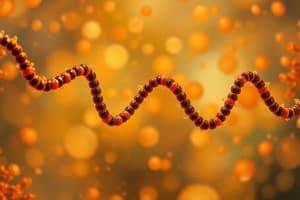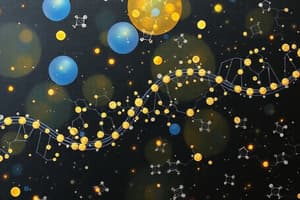Podcast
Questions and Answers
What type of nucleic acid is similar to DNA but has key differences?
What type of nucleic acid is similar to DNA but has key differences?
- RNA (correct)
- ATP
- DNA
- Protein
What does the term 'bio' in biology mean?
What does the term 'bio' in biology mean?
life
Who is credited with the invention of the compound microscope?
Who is credited with the invention of the compound microscope?
- Hans and Zacharias Janssen (correct)
- Anton van Leeuwenhoek
- Charles Darwin
- Robert Hooke
What is anatomy the study of?
What is anatomy the study of?
___ is the study of fungi.
___ is the study of fungi.
Robert Hooke coined the term 'cell' to describe the structures he observed in cork.
Robert Hooke coined the term 'cell' to describe the structures he observed in cork.
What do prokaryotes primarily consist of?
What do prokaryotes primarily consist of?
Which of the following studies focuses on animal behavior?
Which of the following studies focuses on animal behavior?
Match the following scientific disciplines with their focus areas:
Match the following scientific disciplines with their focus areas:
Flashcards are hidden until you start studying
Study Notes
General Biology Overview
- Biology, derived from the Greek “bio” (life) and “logus” (study), focuses on living organisms and is a key branch of natural sciences.
- Professionals in this field are called biologists and may specialize in various life sciences.
Types of Life Sciences
- Zoology: Study of animals.
- Botany: Study of plants.
- Specializations may intersect with medicine and agriculture.
Key Areas in Biology
- Anatomy: Study of the structure of living organisms.
- Biotechnology: Manipulation of living matter, including genetic modification.
- Bioengineering: Application of biological concepts via engineering principles.
- Cell Biology: Examines the molecular aspects and chemical interactions within cells.
- Ecology: Studies relationships among organisms and their environment.
- Entomology: Focuses on the study of insects.
- Ethology: Investigates animal behavior.
- Genetics: Explores genes and inheritance.
- Microbiology: Examines microorganisms and their ecosystems.
- Mycology: Study of fungi.
- Paleontology: Concerned with fossils and early life evidence.
- Pathology: Investigates diseases and their processes.
- Physiology: Studies the functions of living organisms and their parts.
- Taxonomy: Involves the classification and naming of organisms.
Historical Contributions to Microscopy
- Hans and Zacharias Janssen: Credited with the invention of the compound microscope in the late 16th century, featuring two lenses for enhanced magnification.
- Robert Hooke: Known as the "Father of Microscopy," he discovered cells in cork slices using a microscope between 1663-1665, coining the term "cell."
- Antonie van Leeuwenhoek: Enhanced microscopy in the 17th century with single-lens microscopes capable of magnifying objects up to 300 times, observing microorganisms like bacteria.
Microscope Components
- Mechanical Parts: Provide support and adjustments for the microscope.
- Magnifying Parts: Essential for enlarging specimens.
Cell Classification
- Prokaryotes: Single-celled organisms under the domains Bacteria and Archaea, lacking membrane-bound structures.
- Eukaryotes: Organisms with complex, membrane-bound cellular structures.
Microscopy
- Microscope: A vital tool used for observing objects too small for the naked eye, revolutionizing fields like microbiology.
Studying That Suits You
Use AI to generate personalized quizzes and flashcards to suit your learning preferences.




